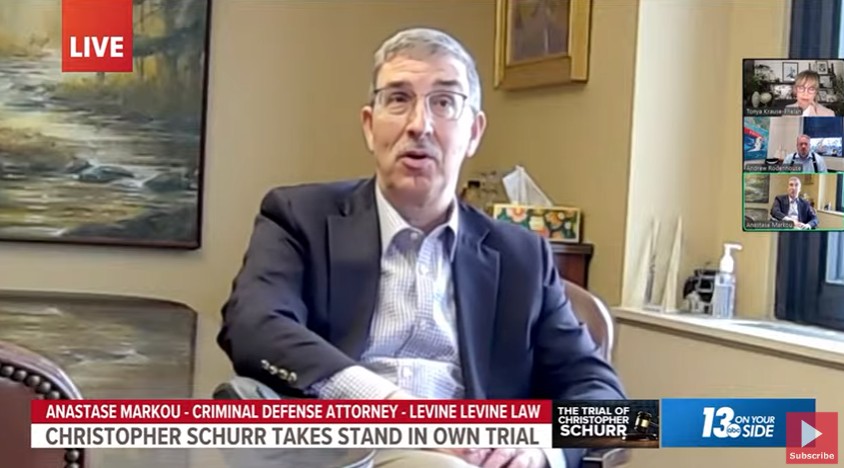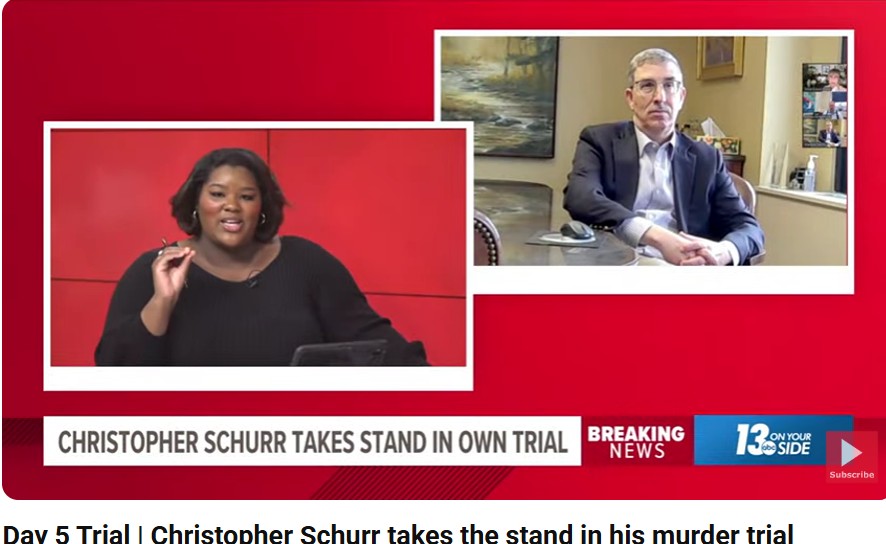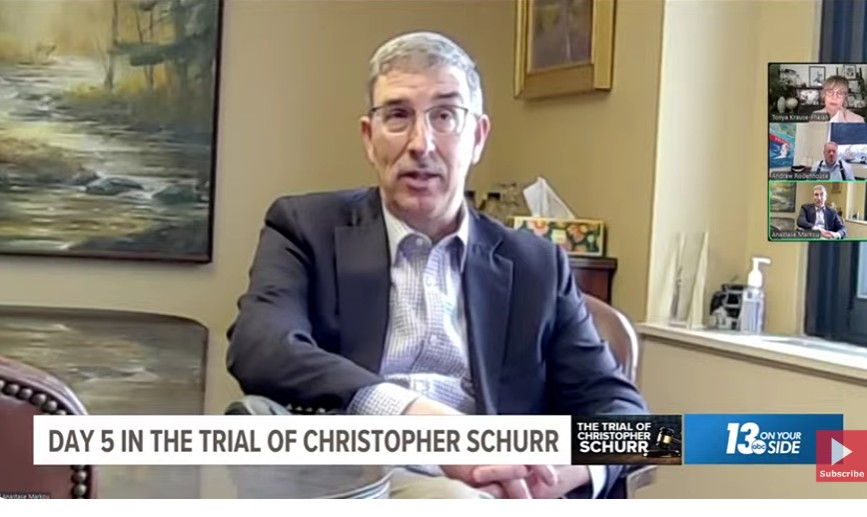
On Friday, May 2, Criminal Defense Attorney Anastase Markou provided live legal expertise on WZZM 13 through its livestreaming digital platforms for the fifth day of the murder trial of former GRPD officer Christopher Schurr, shortly after Schurr, himself, testified on the witness stand.
Schurr is charged with second-degree murder in connection to the shooting death of Patrick Lyoya in April 2022. During the courtroom’s lunch recess on Friday, Markou participated as a panel expert during WZZM’s digital livestream.
WZZM: This morning, on day five the trial, we saw Christopher Schurr take the stand. What is your initial reaction to not only to seeing Schurr on the stand, but his response to the questions?
“He did an excellent job at establishing the facts he needs – in order to give his lawyers the ability to argue self-defense to the jury,” said Markou. “He did a really good job. I thought how the jury reacted to his tone and his mannerisms – that’s a little bit more up in the air. He didn’t show a lot of emotion and I’m not sure how that’s going to play in front of the jury. But overall, he answered the questions directly. He didn’t argue with either side. I thought, overall, he did a very good job.”
WZZM: What is your reaction to the questions presented to Schurr by the prosecution?
“I’m not surprised by the questioning,” Markou said. “I think the questions that both sides have set up throughout the trial – all about his training and the foot pursuit – was a big part of Prosecutor Becker’s questioning. The question about why he shot him in the head, ‘did you really need to do that,’ basically was implied in his questioning. I thought they asked the questions that were consistent with both sides’ points of view throughout this entire case. So I thought that both sides did what they wanted to do – my impression of it. It’s not like you’re going to be able to get a witness to say, ‘I screwed up. I shot this guy and I should be found guilty of murder.’ That’s nothing that Prosecutor Becker is going to be able to do. But he made his points about whether or not this was really necessary. He made his points about whether he really needed a follow him and whether or not he really needed to shoot him in the head. The defense did the same. ‘I’m tired. I’m worn out. I’m exhausted. I thought I was going to die.’ That was well presented – on both sides.
“I thought it was interesting that they were asking questions about whether or not this is typical police practice,” Markou said. “The questions, some of them were about police practice, and I think they are wondering whether this is something that should be done – whether or not police should act a certain way. I think they’re really thinking about that – whether this is self-defense or whether or not this is somebody who’s potentially trained to do something that maybe he shouldn’t do. I think that’s really what’s going on here. You don’t really want to read a lot into the jury questions because it could be just one person asking the same question, it could be just a curiosity and not something that is really forefront in their mind. So I don’t want to read a lot into the jury questions, but I thought they were insightful to the extent we want to know if the jury’s paying attention and they are – they’re asking questions pretty much along the themes of the trial.”
WZZM: While the defense has not rested its case yet, when the prosecution did we saw the defense put in motions for a mistrial and directive verdict. Can the prosecution do that or do they have to go to a rebuttal situation?
“The prosecutor cannot move for a directive verdict in a jury trial,” said Markou. “The only body that can decide innocence in this case is the jury. They cannot move for a directive verdict because they are the prosecutor. They’re either going to bring a rebuttal or go into closings. There is still the question about whether the defense is going to bring other witnesses – it’s possible. But they’re going to wait until after Mr. Schurr’s testimony to bring in other character witnesses about his truthfulness and honesty and humanize him – maybe that’s what they want to end on. But I think we’re really close to the end here. The rebuttal here is going to be fairly limited. We’re either going to get maybe to the end of the proofs today and closing next week or they may go into closings this afternoon. I think it’s more likely that closings will be next week.”
WZZM: What are you expecting to see next? What are you excited for? What are your final thoughts as we move to possibly the end of this trial?
“One of the things I’m curious about is whether or not the judge, down the road, instructs the jury on voluntary manslaughter,” Markou said. “I think the judge probably has to at this stage because it’s something called, necessarily lesser included offensive murder. What that means is voluntary manslaughter is under the umbrella of murder and presenting evidence of Mr. Schurr acting in a heat of passion, at a high intensity, out of high emotion; then the judge might instruct even over both parties – the judge could potentially do that. So that’s going to be an interesting issue. For me, because I love the law, and the concepts of self-defense, I’m curious how the judge instructs certain elements of self-defense, like duty to retreat, and whether or not necessity is required – a lot of different things that come into play when the judge instructs the jury.
“The closings, we know what the closings are going to be. We’ve heard their arguments through their cross examination and their openings. I’m really curious to see what the judge thinks and how she instructs the jury down the road.”
WZZM: If the judge instructs on voluntary manslaughter, does that mean the second-degree murder charge is thrown out? How would this change things for the outcome if the decision is made one way or the other?
“The jury, as instructed, are supposed to start with the most serious charge and decide whether the person is guilty or not – and that would be second-degree murder,” Markou said. “Then they go to the next charge – that’s what they’re instructed to do; and the next charge under that is voluntary manslaughter. That’s considered a less serious crime – and carries less severe punishment, if convicted of that. That’s the procedure. Through all of that, they’re supposed to consider if self-defense applies to both of those. Self-defense is a complete defense, a complete justification for both voluntary manslaughter and second-degree murder.”
Watch the full panel discussion starting at the 4:11:31 mark: https://bit.ly/4jYvnHB



